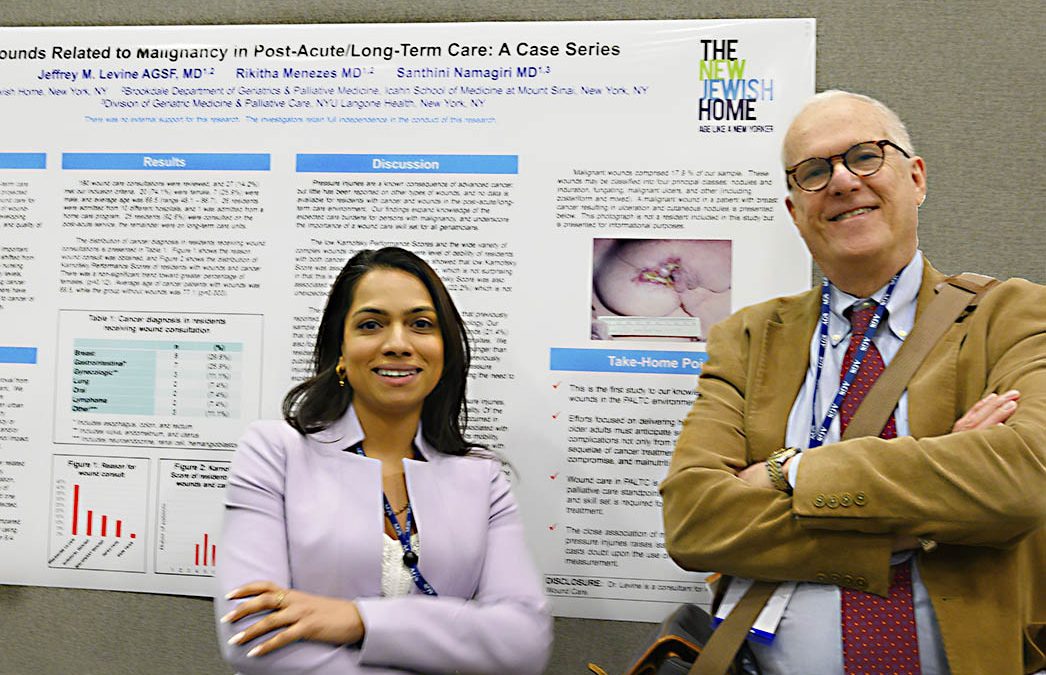I just returned from the American Geriatrics Society Annual Meeting in Portland, Oregon, where parts of my wound care research were presented as a poster. My co-author was geriatrician-in-training Dr. Rikitha Menezes, who participated in data collection. Rikitha came from Canada to New York City for a year of fellowship at the Department of Geriatrics and Palliative Medicine at the Icahn School of Medicine at Mount Sinai where I hold an appointment as Associate Clinical Professor. The third collaborating author was Dr. Santhini Namagiri, an attending physician at the New Jewish Home in Manhattan who holds an appointment with NYU Langone Health.
For those not familiar with a poster session, this is a forum for sharing peer-reviewed research in a setting that encourages networking and face-to-face sharing of emerging information with colleagues from academic programs across the country. Our poster was entitled Wounds Related to Malignancy in Post-Acute/Long-term Care: A Case Series, and was the only wound-related poster among 947 others presented at the AGS national meeting! This sad fact attests to the dire need for more wound care exposure among geriatric fellows, particularly in light of the fact that pressure injuries are an under-appreciated public health issue that disproportionately affects older adults. Luckily there was a well attended wound care symposium led by my West Coast colleague Dr. Elizabeth Foy White-Chu.
This poster reviewed one year of wound consultations, selecting nursing home residents with both cancer and wounds. Residents were analyzed for characteristics that included age, gender, type of malignancy, presence of metastases, wound classification, infection, and follow-up after one month. In addition to presentation as a poster which is generally a bare-bones synopsis, the data were analyzed in greater detail and developed into a manuscript that will be published in Advances in Skin & Wound Care – one of the most influential journals in the field.
In my position as wound consultant for the New Jewish Home, I have the privilege of assisting with care of some of the most debilitated and medically complex residents. My arrangement with the facility is supported by Advantage Surgical & Wound Care, a company that partners with nursing homes across the country to provide quality wound care. At the New Jewish Home, I have the pleasure of bedside teaching of geriatric fellows, and the opportunity to mentor select fellows in research projects.
As a geriatric fellow at the Jewish Home in the 1980’s I had the privilege of training under Dr. Leslie S. Libow, one of the founders of the field. Like many other fellows at the time, he inspired me to work with nursing home residents, relishing the challenge of helping people with multiple advanced chronic illnesses. I will never forget the words he so eloquently wrote in an article in The Gerontologist:
“Our work is a pleasure, yet the outsider often wonders how we do it. Like so many of you, I enjoy older people. I like the art of medicine. I like the process of science. I am attracted to humanism and social-psychological dynamics. I favor the underdog. I enjoy a struggle and advocacy. Geriatrics and gerontology have satisfied those desires in me more than a person can hope for.”
After fellowship training I moved to other institutions as my career evolved to focus entirely on wounds, and I’ve had the amazing experience of learning the art and science of wound care from outstanding nurses and doctors who generously shared their knowledge with me. In a demonstration of the circularity of life, after three decades I returned to the Jewish Home to practice wound care and participate in the training program for geriatric fellows. The opportunity to assist with the care of medically complex patients while sharing some of my hard-earned knowledge with fellows-in-training has been perhaps the most satisfying part of my professional life.
* * * * * * * * * * * * * * *
Complete citation for Dr. Libow’s article is:
Libow LS. Geriatric Medicine and the Nursing Home: A Mechanism for Mutual Excellence. The Gerontologist (1982) 22 (2):134-141.
Related posts:
Shakespeare, the Diversity of Aging, and the Need for Geriatrics
Geriatric Patients are Different
Wound Care in the Geriatrics Review Syllabus
Wound Care: What the Medical Director Needs to Know
Wound Care Boot Camp at the AMDA/PALTC Annual Meeting

